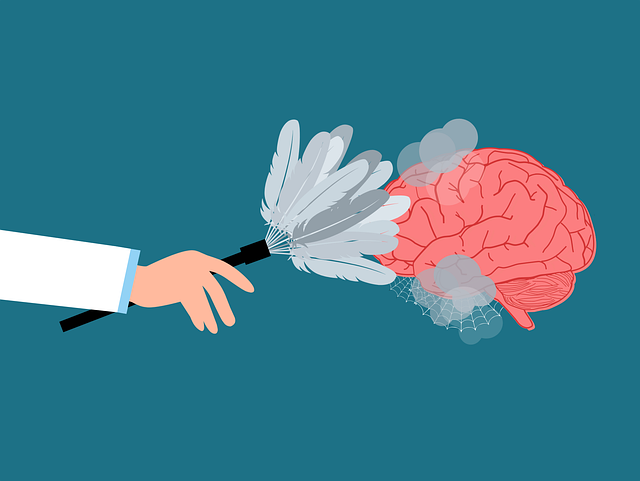Crisis Intervention Teams (CITs) at Highlands Ranch Chronic Pain Therapy play a vital role in mental health support, offering immediate assistance during acute crises and high-risk situations. Trained professionals from healthcare, law enforcement, and social services use self-awareness exercises and trauma support to enhance de-escalation skills. Public awareness campaigns empower CIT members to recognize distress signs, leading to improved patient outcomes. The community benefits from well-structured initiatives like the Community Outreach Program and Mental Wellness Podcast Series, fostering resilience and early intervention. A specialized crisis intervention training program for caregivers supports them in managing chronic pain situations, incorporating mental wellness coaching for their emotional well-being.
In today’s fast-paced world, crisis intervention team (CIT) training programs are becoming increasingly vital in mental health support. This article delves into the critical role of CITs and their impact on managing crises effectively. We explore why structured training is essential for healthcare professionals, particularly those at Highlands Ranch Chronic Pain Therapy, to handle complex situations with care and competence. By understanding CITs’ unique dynamics, we can revolutionize crisis response and foster better patient outcomes.
- Understanding Crisis Intervention Teams: Role and Impact in Mental Health Support
- The Importance of Training Programs for Effective Crisis Response
- Highlands Ranch Chronic Pain Therapy: Strategies for Equipping Caregivers to Handle Crises
Understanding Crisis Intervention Teams: Role and Impact in Mental Health Support

Crisis Intervention Teams (CITs) play a pivotal role in mental health support, particularly when addressing acute crises and high-risk situations. These specialized teams consist of trained professionals from various disciplines, including healthcare, law enforcement, and social services. Their primary goal is to provide immediate and effective assistance to individuals experiencing severe emotional distress or psychological trauma.
In the context of Highlands Ranch Chronic Pain Therapy and similar mental health support services, CITs can significantly impact crisis management. By integrating self-awareness exercises and trauma support services within their training programs, these teams enhance their ability to de-escalate high-stress scenarios. Public awareness campaigns development around mental health issues further empowers CIT members to recognize signs of distress and offer timely intervention, ultimately improving patient outcomes and community well-being.
The Importance of Training Programs for Effective Crisis Response

Effective crisis response is a cornerstone of any thriving community, and well-structured training programs play a pivotal role in achieving this. In the context of Highlands Ranch Chronic Pain Therapy, specialized training equips individuals with the knowledge and tools to navigate crises successfully. These programs go beyond mere reactionary measures; they empower participants to anticipate, prevent, and manage crises effectively, ensuring better outcomes for those facing mental health challenges.
Training initiatives like Community Outreach Program Implementation foster a supportive network where coping skills development becomes a shared priority. By integrating these lessons into the fabric of local communities, we create an environment that promotes resilience and early intervention. Additionally, the Mental Wellness Podcast Series Production can amplify educational content, making crisis intervention techniques accessible to a broader audience. Such initiatives ultimately strengthen the community’s ability to respond cohesively during times of crisis.
Highlands Ranch Chronic Pain Therapy: Strategies for Equipping Caregivers to Handle Crises

Highlands Ranch Chronic Pain Therapy offers a specialized approach to crisis intervention training, focusing on empowering caregivers to effectively navigate challenging situations. This program recognizes the unique demands placed on those supporting individuals with chronic pain and aims to equip them with the necessary tools for crisis management. Through interactive workshops and real-life scenario simulations, participants gain insights into recognizing early warning signs of crises and implementing tailored strategies to de-escalate tensions.
The curriculum integrates evidence-based practices alongside practical techniques, ensuring caregivers feel prepared to handle a range of crises. By combining education with skill development, this initiative fosters a supportive community among participants, encouraging knowledge sharing and collaborative problem-solving. Additionally, the program’s holistic approach encourages mental wellness coaching, recognizing that supporting someone with chronic pain can be emotionally taxing. This comprehensive strategy ensures caregivers are not only equipped to handle crises but also prioritize their own mental wellness.
Crisis intervention team (CIT) training programs, such as those offered in Highlands Ranch Chronic Pain Therapy, are essential for equipping caregivers and healthcare professionals with the skills to effectively navigate mental health crises. By understanding CIT roles and investing in comprehensive training, we can significantly improve crisis response, ultimately enhancing support for individuals in need. This holistic approach ensures that those facing mental health challenges receive prompt, competent care, fostering better outcomes and a more resilient community.














